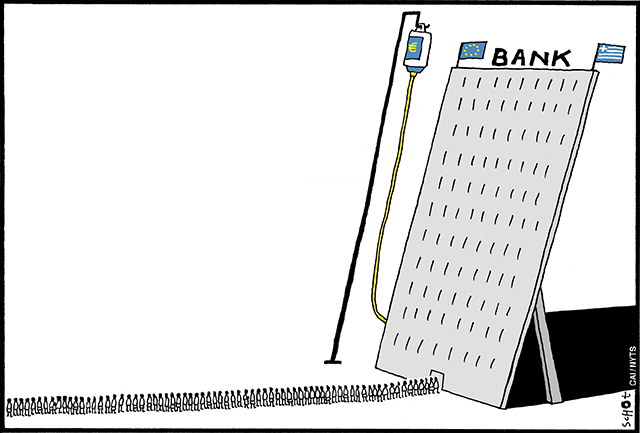
Did you know that Truthout is a nonprofit and independently funded by readers like you? If you value what we do, please support our work with a donation.
However things play out from here – and I find it hard to see a path forward other than Grexit – the troika’s program for Greece represents one of history’s epic policy failures.
Even if you ignore the economic and human toll, the program was an utter failure in terms of restoring solvency. In 2009, before the troika’s policies went into effect, Greece’s debt was 126 percent of gross domestic product. After five years, debt was… 177 percent of GDP.
How did that happen? Did the Greeks just continue to borrow massive amounts of money?
The answer is a definite no. Greek debt at the end of 2014 was only 6 percent higher than it was at the end of 2009. Admittedly, that number reflects a significant haircut on private debt, but it has nothing to do with the continued borrowing binge that some people imagine. What happened instead, of course, was the collapse of GDP.
What all this suggests is that the troika program was simply infeasible, and it would have been infeasible no matter how willing the Greeks had been to make sacrifices. The more they cut, the worse things got.
I suppose you can argue that structural reforms might have delivered a boost in competitiveness. But the truth is that there’s very little evidence supporting the conventional faith in such reforms. Some of my more conventional contacts like to insist that austerity in Greece was unavoidable – and it’s true that, one way or another, Greece was going to have to achieve a primary surplus. If currency devaluation had been an option, this would have required much less austerity, because of the boost provided by easier monetary policy. But within the euro, deep austerity was indeed something that had to happen. The key point, however, is that austerity measures ended up being not just incredibly painful, but completely futile, because they weren’t accompanied by massive debt relief.
Is this kind of futility always the case? Not necessarily – if you do the arithmetic, it becomes clear that a lot depends on the initial level of debt. If Greece had received major debt forgiveness, it would at least have had some hint of an eventual exit.
Instead, Greece was pushed into a cycle of ever-worse pain without hope.
Trump is silencing political dissent. We appeal for your support.
Progressive nonprofits are the latest target caught in Trump’s crosshairs. With the aim of eliminating political opposition, Trump and his sycophants are working to curb government funding, constrain private foundations, and even cut tax-exempt status from organizations he dislikes.
We’re concerned, because Truthout is not immune to such bad-faith attacks.
We can only resist Trump’s attacks by cultivating a strong base of support. The right-wing mediasphere is funded comfortably by billionaire owners and venture capitalist philanthropists. At Truthout, we have you.
Truthout has launched a fundraiser, and we have only 48 hours left to raise $22,000. Please take a meaningful action in the fight against authoritarianism: make a one-time or monthly donation to Truthout. If you have the means, please dig deep.